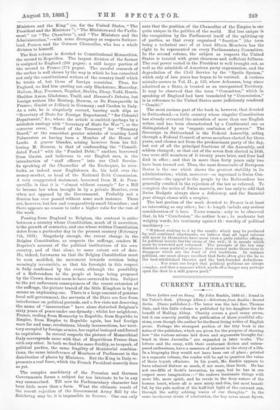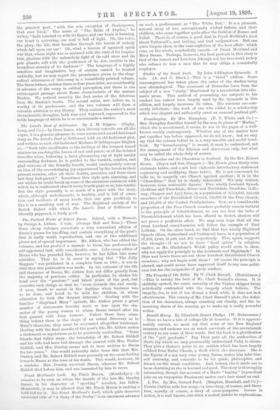CURRENT LITERATURE.
Three Letters and an Essay. By John Ruskin, 1888-41; found in his Tutor's desk. (George Allen.)—Selections from .Ruskin: Second Series. (Same publisher.)—The tutor was the late Rev. Thomas Dale, and this little volume is published by his daughter for the benefit of Mailing Abbey. Charity covers a good many errors, but it can scarcely justify the publication of these youthful effu- sions, even though the author be the finest living writer of English prose. Perhaps the strangest portion of the tiny book is the notes of the publisher, which are given for the purpose of showing how "the various axioms laid down and arguments brought for- ward in those Juvenilia " are expanded in later works. The letters and the essay, with their exuberant diction and untem- pered enthusiasm, have a measure of interest in the story of a life. In a biography they would not have been out of place ; printed in a separate volume, the reader will be apt to question the value of these boyish effusions. In his youth, Mr. Ruskin appears to have admired Bulwer as much, if not more, than Scott. He has not one-fifth of Scott's invention, he says, but he has in one respect more imagination :—" He endows inanimate things with more life, more spirit, and he revels in the deep waters of the human heart, whore all is seen misty and dim, but most beauti- ful, by the pale motion of the half-lost light of the outward sun, through the softly sobbing waves of our thoughts." In the same incoherent strain of admiration, the boy raves about Byron, the greatest poet, " with the sole exception of Shakespeare, that ever lived." The name of " The Bride of Abydos," he writes, "hath touched us with its finger, and our brain is burning, our heart is quivering, our soul is full of light. Oh, the voice, the glory, the life, that breathes through the bursts of melody which fall upon our ear ! Oh, what a heaven of agonised spirit was that, whose night was so matured with the rush of its inspira- tion, glorious with the melancholy light of its cold stars and its pale planets, soft with the gentleness of its dew, terrible in the boundless eternity of its darkness !" The language of a highly sensitive and imaginative boy of sixteen cannot be treated unkindly, but we may regret the prominence given to the rhap- sodical utterances of this essay in a beautifully printed volume. The three letters, written three or four years later, are considerably in advance of the essay in critical perception, and there is one extravagant passage about Rome characteristic of the mature Ruskin. We noticed recently the first series of the Selections from Mr. Ruskin's works. The second series, now before us, is worthy of its predecessor, and the two volumes will form a valuable addition to any library. They contain the author's most characteristic thoughts, both wise and wayward, expressed in the noble language of which he is so consummate a master.



































 Previous page
Previous page